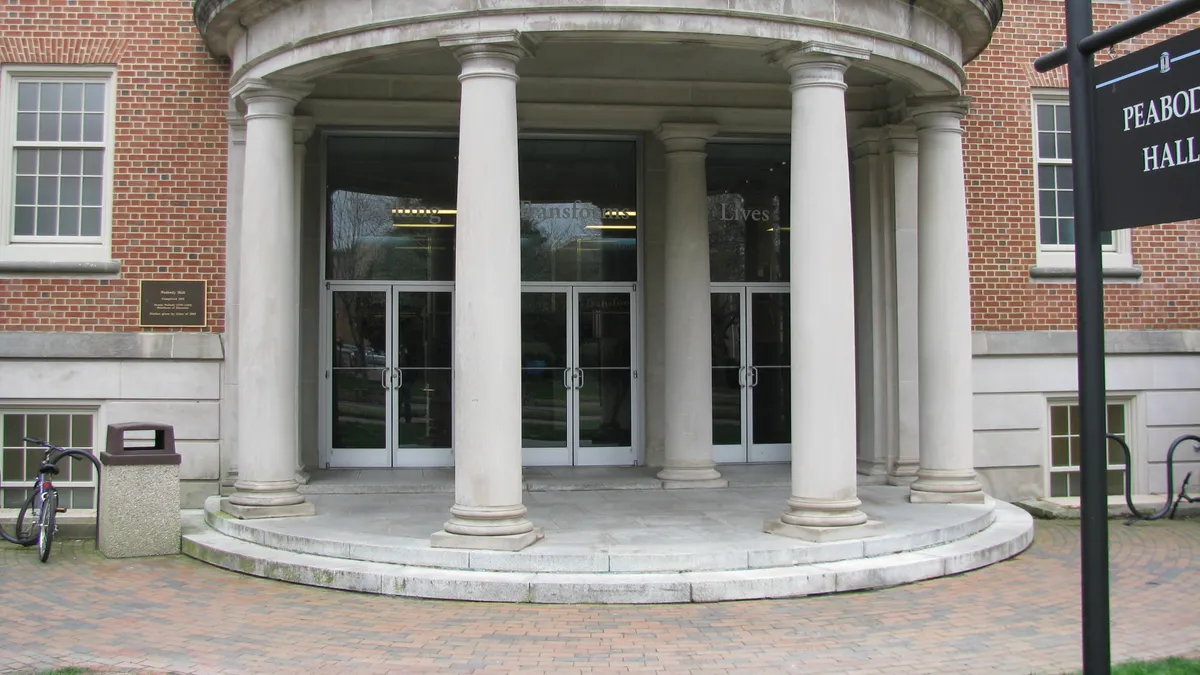Dive Brief:
-
The University of North Carolina's governing board voted Thursday to expand the powers of the system's president in selecting chancellors for its 17 campuses, a change many faculty members oppose and say erodes institutional autonomy.
-
President Peter Hans can now handpick two contenders in a chancellor search, at least one of whom must become a finalist. Hans could then recommend a final candidate from that list.
-
UNC's governance has been plagued by partisanship. Skeptics of the new policy say it might further politicize the chancellor positions, and that it speaks to the challenges of finding institutional leaders nationwide.
Dive Insight:
The UNC System is unusual in the U.S. higher education landscape in that state legislators appoint its board of governors entirely, creating in the last decade a dynamic of the Republican-dominated legislature swaying its decisions.
State lawmakers' influence has extended to system leadership, as Hans' predecessors departed under political pressures. Some chancellorships have also been tumultuous. A former East Carolina University chancellor was forced out, and Carol Folt, the previous head of UNC-Chapel Hill, resigned early amid a controversy over a Confederate monument on campus.
During their meeting Thursday, some governing board members who supported the new process presented it as a way to limit conflict between the system president and the chancellors, likening Hans to a CEO who must work successfully with his managers.
The change would also help cultivate a "diverse" pipeline of talent within and outside of the UNC System, Hans said in his remarks, without delving into specifics of how it would do so. The policy references that the two candidates would come from the president's "succession planning efforts" but does not expand on what those efforts entail.
Previously, campus trustee boards would search for chancellor candidates and develop a list of finalists from which the system president would make a selection and the board of governors would vote to approve. Hans' new powers enable him to add his two picks to the candidate pool at the campus level, though they must still go through the typical vetting process.
Faculty across the system have railed against the new procedures. East Carolina's chapter of the American Association of University Professors in a resolution last month called them a "radical and dangerous expansion in the powers of the system President" that "would eradicate institutional sovereignty and shared governance in the process where it is most critical."
East Carolina is in the midst of a chancellor search beset by widespread rumors that North Carolina House Speaker Tim Moore, a Republican, is angling for the position.
Board member Leo Daughtry said during the meeting he feared the policy shift would render institutions a "dumping ground for tired politicians" and others.
However, it will not apply to the current hunts for the chancellors of East Carolina and Fayetteville State University, Hans confirmed during the meeting.
Still, the change "generates further questions" about who ultimately is making decisions for campuses, said Kevin McClure, a higher education professor at UNC-Wilmington.
It further takes away campuses' ability "to really have a say in who is selected for leadership, and makes a more top-heavy process," McClure said, adding that faculty members already have a diminished voice in chancellor searches. They might be involved with search committees, but the system heavily leans on consultants to suss out candidates, McClure said.
Presidential and chancellor searches nationwide have grown more complex in recent years, and some have been subject to complaints they are not transparent enough. Politics, too, plays an increasing role in who is selected, McClure said.
Last year, for instance, South Carolina Gov. Henry McMaster, a Republican, reportedly pressured trustees at the University of South Carolina to hire his preferred presidential candidate, Robert Caslen.
Calsen was a deeply unpopular pick in some circles for past comments blaming binge drinking for sexual assaults. Some also took exception with his experience as a combat veteran, and that he was close to becoming President Donald Trump's national security adviser.
Finding those willing to take a job as a top campus executive has become more difficult, McClure said, especially amid the pandemic. College presidents' average tenure has gradually diminished over the last several years.
"People just aren't busting doors down to take these positions," McClure said. "In North Carolina that's especially true."














